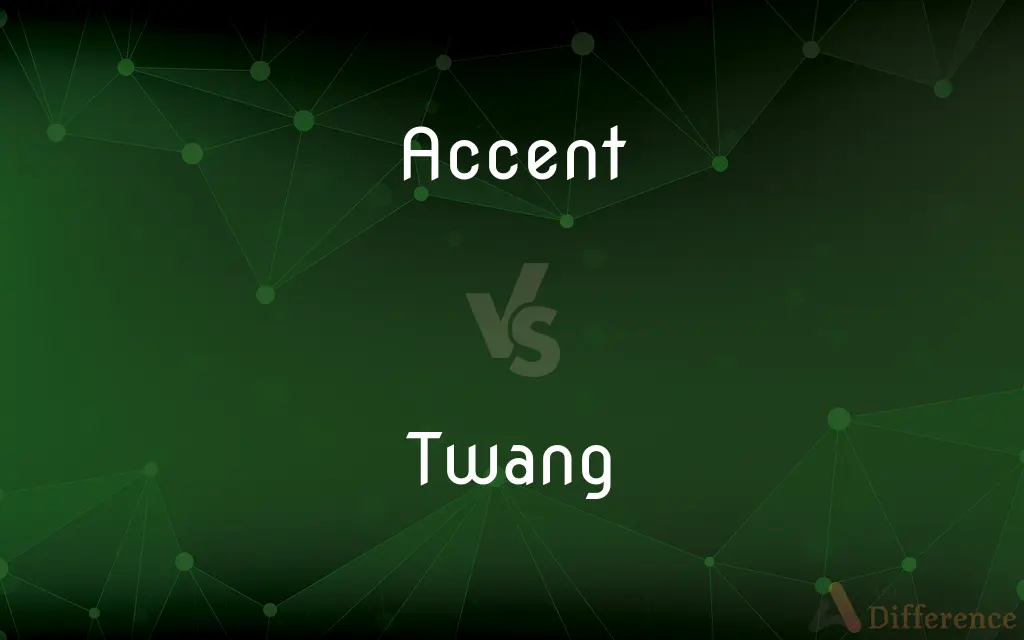Accent vs. Twang — What's the Difference?

Difference Between Accent and Twang
ADVERTISEMENT
Compare with Definitions
Accent
The relative prominence of a particular syllable of a word by greater intensity or by variation or modulation of pitch or tone.
Twang
Twang is an onomatopoeia originally used to describe the sound of a vibrating bow string after the arrow is released. By extension it applies to the similar vibration produced when the string of a musical instrument is plucked, and similar sounds.
Accent
Vocal prominence or emphasis given to a particular syllable, word, or phrase.
Twang
To emit a sharp, vibrating sound, as the string of a musical instrument does when it is plucked.
Accent
One determined by the regional or social background of the speaker.
ADVERTISEMENT
Twang
To resound with a sharp, vibrating sound.
Accent
One determined by the phonetic characteristics of the speaker's native language carried over to that speaker's use of another language.
Twang
To speak in a strongly nasal tone of voice.
Accent
A mark or symbol used in the printing and writing of certain languages to indicate the vocal quality to be given to a particular letter
An acute accent.
Twang
To cause to make a sharp, vibrating sound
Twanged the car antenna.
Accent
A mark or symbol used in printing and writing to indicate the stressed syllables of a spoken word.
Twang
To utter with a strongly nasal tone of voice.
Accent
Rhythmically significant stress in a line of verse.
Twang
A sharp, vibrating sound, as that of a plucked string.
Accent
Emphasis or prominence given to a note or chord, as by an increase in volume or extended duration.
Twang
A strongly nasal tone of voice, especially as a peculiarity of certain regional dialects.
Accent
A mark representing this.
Twang
The sharp, quick sound of a vibrating tight string, for example, of a bow or a musical instrument.
Accent
A mark used as a superscript to distinguish among variables represented by the same symbol.
Twang
(music) A particular sharp vibrating sound characteristic of electric guitars.
Accent
A mark used as a superscript to indicate the first derivative of a variable.
Twang
A trace of a regional or foreign accent in someone's voice.
Despite having lived in Canada for 20 years, he still has that Eastern-European twang in his voice.
Accent
A mark or one of several marks used as a superscript to indicate a unit, such as feet (′) and inches (") in linear measurement.
Twang
(phonetics) The sound quality that appears in the human voice when the epilaryngeal tube is narrowed.
Accent
A distinctive feature or quality, such as a feature that accentuates, contrasts with, or complements a decorative style.
Twang
A sharp, disagreeable taste or flavor.
Accent
Something that accentuates or contrasts something else, as a touch of color that makes the features of an image stand out.
Twang
An annoying or stupid person, recalcitrant.
Accent
Particular importance or interest; emphasis
The accent is on comfort.
Twang
(ambitransitive) To produce or cause to produce a sharp vibrating sound, like a tense string pulled and suddenly let go.
Accent
To stress or emphasize the pronunciation of
Accented the first syllable in “debacle.”.
Twang
(intransitive) To have a nasal sound.
Accent
To mark with a printed accent.
Twang
(intransitive) To have a trace of a regional or foreign accent.
Accent
To focus attention on; accentuate
A program that accents leadership development.
Twang
(music) To play a stringed musical instrument by plucking and snapping.
Accent
(linguistics) A higher-pitched or stronger (louder or longer) articulation of a particular syllable of a word or phrase in order to distinguish it from the others or to emphasize it.
In the word "careful", the accent is placed on the first syllable.
Twang
A tang. See Tang a state.
Accent
(figuratively) Emphasis or importance in general.
At this hotel, the accent is on luxury.
Twang
A harsh, quick sound, like that made by a stretched string when pulled and suddenly let go; as, the twang of a bowstring.
Accent
(orthography) A mark or character used in writing, in order to indicate the place of the spoken accent, or to indicate the nature or quality of the vowel marked.
The name Cézanne is written with an acute accent.
Twang
An affected modulation of the voice; a kind of nasal sound.
He has such a twang in his discourse.
Accent
Modulation of the voice in speaking; the manner of speaking or pronouncing; a peculiar or characteristic modification of the voice, expressing emotion; tone.
Twang
To sound with a quick, harsh noise; to make the sound of a tense string pulled and suddenly let go; as, the bowstring twanged.
Accent
The distinctive manner of pronouncing a language associated with a particular region, social group, etc., whether of a native speaker or a foreign speaker; the phonetic and phonological aspects of a dialect.
A foreign accent
A broad Irish accent
A hint of a German accent
Twang
To make to sound, as by pulling a tense string and letting it go suddenly.
Sounds the tough horn, and twangs the quivering string.
Accent
A manner of pronunciation suggesting that the speaker is from a different region; a foreign accent.
My professor's accent is so thick that it's difficult to understand her lectures.
She spoke with a strong accent that betrayed her southern roots.
I was surprised to learn that he was an immigrant, as he spoke without any accent.
Twang
A sharp vibrating sound (as of a plucked string)
Accent
(sign languages) A distinctive manner of producing a sign language, such as someone who does not normally use a certain sign language might have when using it.
Twang
Exaggerated nasality in speech (as in some regional dialects)
Accent
A word; a significant tone or sound.
Twang
Cause to sound with a twang;
He twanged the guitar string
Accent
Expressions in general; speech.
Twang
Sound with a twang;
The bowstring was twanging
Accent
Stress laid on certain syllables of a verse.
Twang
Twitch or throb with pain
Accent
(music) A regularly recurring stress upon the tone to mark the beginning, and, more feebly, the third part of the measure.
Twang
Pluck (strings of an instrument);
He twanged his bow
Accent
(music) A special emphasis of a tone, even in the weaker part of the measure.
Twang
Pronounce with a nasal twang
Accent
(music) A mark used to represent this special emphasis.The third and fourth symbols are accents (marks used to represent special emphasis in music).
Accent
(music) The rhythmical accent, which marks phrases and sections of a period.
Accent
(mathematics) A prime symbol.
Accent
Emphasis laid on a part of an artistic design or composition; an emphasized detail, in particular a detail in sharp contrast to its surroundings.
Accent color
Accent
A very small gemstone set into a piece of jewellery.
Accent
(archaic) Utterance.
Accent
(transitive) To express the accent of vocally; to utter with accent.
Accent
(transitive) To mark emphatically; to emphasize; to accentuate; to make prominent.
Accent
(transitive) To mark with written accents.
Accent
A superior force of voice or of articulative effort upon some particular syllable of a word or a phrase, distinguishing it from the others.
Accent
A mark or character used in writing, and serving to regulate the pronunciation; esp.: (a) a mark to indicate the nature and place of the spoken accent; (b) a mark to indicate the quality of sound of the vowel marked; as, the French accents.
Accent
Modulation of the voice in speaking; manner of speaking or pronouncing; peculiar or characteristic modification of the voice; tone; as, a foreign accent; a French or a German accent.
The tender accent of a woman's cry.
Accent
A word; a significant tone
Winds! on your wings to Heaven her accents bear,Such words as Heaven alone is fit to hear.
Accent
Stress laid on certain syllables of a verse.
Accent
A regularly recurring stress upon the tone to mark the beginning, and, more feebly, the third part of the measure.
Accent
A mark placed at the right hand of a letter, and a little above it, to distinguish magnitudes of a similar kind expressed by the same letter, but differing in value, as y´, y.
Accent
To express the accent of (either by the voice or by a mark); to utter or to mark with accent.
Accent
To mark emphatically; to emphasize.
Accent
Distinctive manner of oral expression;
He couldn't suppress his contemptuous accent
She had a very clear speech pattern
Accent
Special importance or significance;
The red light gave the central figure increased emphasis
The room was decorated in shades of gray with distinctive red accents
Accent
The usage or vocabulary that is characteristic of a specific group of people;
The immigrants spoke an odd dialect of English
He has a strong German accent
Accent
The relative prominence of a syllable or musical note (especially with regard to stress or pitch);
He put the stress on the wrong syllable
Accent
A diacritical mark used to indicate stress or placed above a vowel to indicate a special pronunciation
Accent
To stress, single out as important;
Dr. Jones emphasizes exercise in addition to a change in diet
Accent
Put stress on; utter with an accent;
In Farsi, you accent the last syllable of each word
Share Your Discovery

Previous Comparison
Sandbar vs. Beach
Next Comparison
Exciting vs. Excited













































